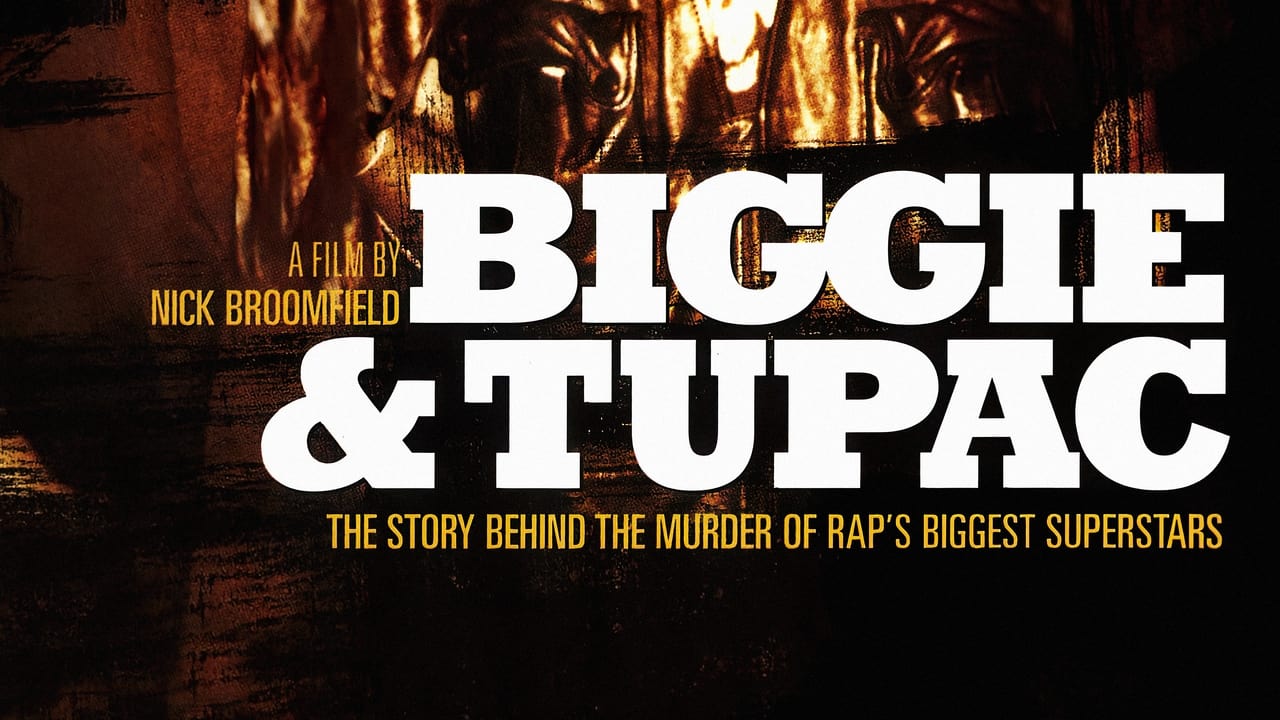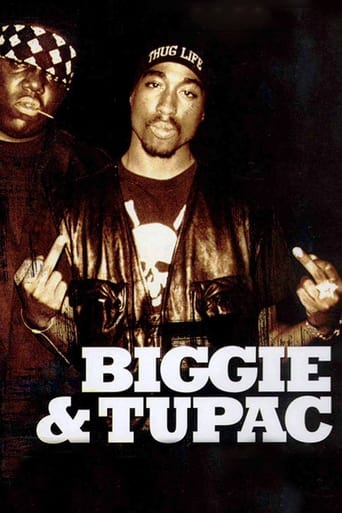

Very well executed
... View MoreSlow pace in the most part of the movie.
... View MoreMost undeservingly overhyped movie of all time??
... View MoreBlistering performances.
... View MoreThis documentary was very interesting and informative about the Tupac - Biggie relationship. The information they get is believable and their research is impressive.The only problem I have with the documentary is that it lacks a little bit of charisma and some things are not explained very well.
... View MoreI'm a big Notorious B.I.G. fan and believer of Tupac's N.I.G.G.A.Z. philosophy so when i seen the video tape at Wal-mart, i knew i had to own it. When I brought it home, i was hoping to find a link between their deaths and the police cover-up i've been hearing about in LA (mind you i live in north Carolina). What I got was a brutally honest, horrifying, well thought out documentary. The main argument about Nick Broomfield from Kurt And Courtney was his seemingly one sided mission to make you believe HIS truth. He does it here but instead of just interviews from people with a vendetta (and trust me, there are plenty here) with the culprits Broomfield say are responsible for their deaths, we also get interviews from BIG's Mother, Tupac's step-brother(who i seen as a opportunistic jackass), Former bodyguards for both Pac and Big, and the most important of all, Death Row CEO Suge Knight. The Most entertaining is of course Knight, not because of what he says happen( he refused to comment on either deaths, sorry ) but because of the remarks he makes of Snoop Dogg(wonder what he has to do with anything? watch). And if that doesn't do it for you, Volletta Wallace(BIG's mother)'s interview will make you cry(the last one i mean).
... View MoreFilmmaker Nick Broomfield decides to take up the investigation into the murders of Biggie and Tupac in 1996/97. Taking his starting point to be an officer who claims he was discouraged from his investigation and forced off the job due to the involvement of other officers. His investigation leads him to uncover links to the FBI and fingers of suspicion that point all the way to the imprisoned head of Death Row Records, Suge Knight himself.Broomfield has had good documentaries and bad documentaries, this is one of his best efforts and is actually very good work and may help the actual investigation. The basic story sees Broomfield stumbling into various interviews as a sort of wide-eyed innocent. His style can be a little annoying at times and also his voice is quite monotonous but his material is griping.From the one officer that starts his trail, Broomfield uncovers lot of insightful stuff that shows a much bigger picture that has not been publically seen before. For example the FBI were trailing Biggie and Puffy hours before they got killed and had been for quite some time so where were they when they got shot? Asks Lil' Caese why didn't they at least catch the gunman? The conspiracy Broomfield puts forward is quite extreme but the evidence and the witnesses are there at every stage to back it up. By the time Knight is interviewed the case is pretty much made.The film makes very good use of old footage including the East/West kick-off at an awards ceremony and old footage of Tupac in the studio and Biggie rapping live at outdoor shows. The atcual interviews are all good and mostly very illuminating. Knight is quite intimidating but is clearly putting on a face. Lil' Caese is helpful as are many of the bodyguards and cops but the best interviews are with Biggie's mum she doesn't have many facts but she really helps Biggie be a real person rather than just a larger than life rapper. The gaps are as prominent as the people why no Puffy, why no Snoop, why no Faith Evans etc. However those that are involved all provide a lot of information.The music is good throughout (if you're into hip-hop) but can someone tell me why Gangstarr were used several times in favour of the artist's own stuff?Overall this is a must see for all hip-hop fans, but it is also a good view for those who like conspiracy theories. Broomfield's style is a little annoying but the pace and depth of the material is gripping and makes for very, very interesting viewing.
... View MoreAnyone expecting a tawdry,shoddy sleazefest along the lines of "Kurt and Courtney" should be pleasantly surprised here- this is an excellent film.For a start, the conspiracy theory explored here is a far more credible one, and the evidence Broomfield turns up is very convincing in places. One has to wonder how genuine Broomfield's "camera on at all times" approach is, how much was created at the editing stage- he appears to get away with some very transgressive behaviour here on the basis of sheer amateurism, though it is clear the man has balls of iron. he thoughtlessly wanders through some of the worst neighbourhoods in LA and New York- in one classic scene his cameraman deserts him out of sheer fear, leaving him to manage a ludicrous prison interview with despotic Death Row records overlord Suge Knight alone. Irony being lost on Americans for the most part, Broomfield also manages to get away with some outrageous cheek- for instance asking Knight to deliver his "message for the kids" in a tone of smirking condescension.For the heads, there is some great, rare footage on offer- a teenage Biggie ripping up a street corner freestyle battle, hoods dancing on their cars at his funeral, an electrifying Snoop Dog calling out New York at the notorious 95 source awards....plenty in there for the hip hop fan, along with some vintage Biggie and (for some reason) Gang Starr on the soundtrack. Broomfield manages to talk to every major player in the drama, with the notable exception of Afeni Shakur- which also explains the lack of 2Pacs' music on the soundtrack.Despite its grim subject matter, there is much humour on offer here. In short, this is the best "rockumentary" in a very long time, and one that lingers in the mind for some time afterwards.Something of a triumph.
... View More